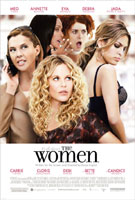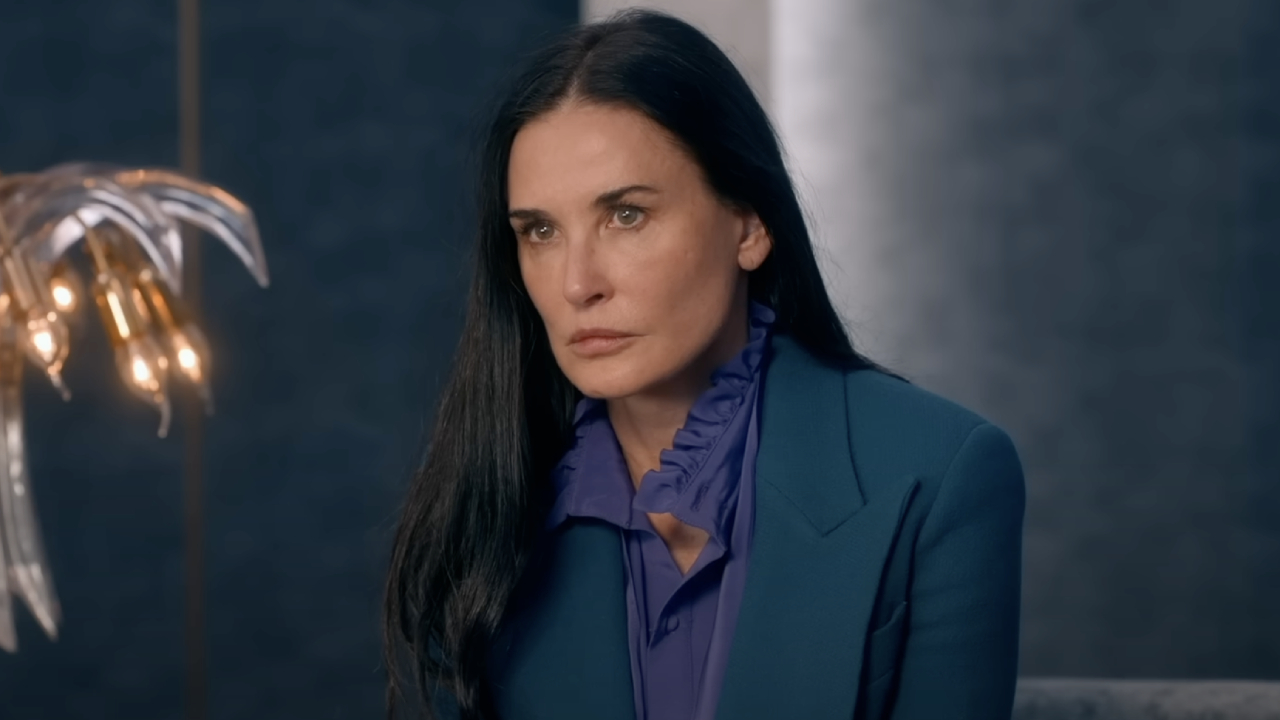The Women is a film so hot and bothered for itself, so wet for its manless premise that it never seems to realize what an disorganized failure it really is. It melodramatically saunters through nearly every cliché ever conceived about women and proves absolutely nothing other than writer/director Diane English’s complete incompetence. Gossip, women hating each other, babies, being passive aggressive, spending too much money, body image issues, careers vs. family, marriage, daughters, mothers, infidelity. This goddamn soap opera with more star power covers it all--poorly--and with enough cattiness to make you thank God you don’t live in a sorority. Like a vapid Pez Machine, The Women dispenses superficial life advice like, “There’s a fine line between an outfit and a getup”, “Nobody hates Saks”, and “Don’t be bitter, it leads to Botox” without ever realizing how selfish and trite those statements make their authors look when belted out at inappropriate moments. This film could have been empowering, could have been a real classic, but instead it will go down as a regrettable stain on the handbag of at least five talented actresses.
Mary Haines (Meg Ryan) is a mother and wife to a fabulously wealthy Wall Street whiz. She seems to have it all until a garrulous manicurist (Debi Mazar) unwittingly tells her of an affair her husband is having with the perfume spritzer (Eva Mendes). Her mother (Candace Bergin) tells her to get out of town for a few weeks. Her friends (Annette Bening, Debra Messing, and Jada Pinkett Smith) tell her to confront the lying bastard. She eventually follows everyone’s advice. That, in and of itself, is the basic premise. Each of the other characters have their own poorly developed and uninteresting side stories, but it seems pointless to inform you of the ins-and-outs when they all lack depth and come off as hastily-thrown together asides.
Oh what could have been. The Women is arguably the greatest collection of actresses assembled since the original 1939 version starring Joan Crawford. Unfortunately, Meg Ryan, Jada Pinkett Smith, Annette Bening, Candice Bergen, Carrie Fischer, and Bette Midler all awkwardly stumble through their scenes without any sense of characterization, leaving only Cloris Leachman and Debra Messing to provide any whiff of substance. Actually, any whiff of substance might be selling Cloris Leachman short. She is the entire life force behind this movie, the only one who seems to give a damn about timing and facial expressions.
Enough about the acting, though. It may not be Oscar-worthy, but the epicenter of this movie’s failure lies with Diane English, who may very well be the worst filmmaker this side of Ed Wood. Take for example the opening sequence in which Annette Bening’s character goes shopping. We’re given an entirely pointless scene of her dog barking at another dog, followed by video game-like graphics denoting the price of each item, as well as her desire to buy said product. A recurring theme, I thought? Nope. At no point do we get anything like this again. In fact, the entire film feels like Diane English ran from the editing room screaming, “Look what I just figured out how to do.” And on-and-on-and-on it goes, making The Women seem like some third grade filmmaking project by a scatter-brained overachiever who found different functions on Photoshop as she went along.
And then there’s the score. Cumbersome, intrusive, and bizarre at points, it frequently squashes the paltry amounts of momentum the film gets going. It stops and starts without warning and probably would have been better left entirely on the cutting room floor. Peter Bretter could have done more in a half hour just using his dark and ominous tones.
The Women is a movie obsessed with its own femininity. For Diane English, being a woman goes beyond just sultry glances and mothering children. In a sense, that’s the problem. You know the obligatory movie scene in which a man is running full speed because he’s late for a job interview and he stops to look at the cleavage of a woman bending over? Well, this movie is the female version of that scene extrapolated out for an hour and a half. It’s hyper-feminism--to the point where it intentionally makes most of its own characters seem like silly little girls. They cry, they fight over nonsensical matters, they stop speaking to each other, they binge-eat, they obsess over men. It’s the type of feminism where women go to the store to confront an adulterous harlot--but not before stopping to look at purses.
This movie is without direction. It’s without purpose. And it’s beyond terrible in almost every conceivable way. It doesn’t advance a cause or even shed light on how to handle specific issues. It’s like a slideshow presentation of every pamphlet in the guidance counselor’s office.
If you’re still considering paying to view this film, I’d advise you to bribe Gloria Steinem with five dollars to suck on her tampon. It’ll save you four bucks and leave you with the same feeling: who on Earth thought this was a good idea?
Mack Rawden is the Editor-In-Chief of CinemaBlend. He first started working at the publication as a writer back in 2007 and has held various jobs at the site in the time since including Managing Editor, Pop Culture Editor and Staff Writer. He now splits his time between working on CinemaBlend’s user experience, helping to plan the site’s editorial direction and writing passionate articles about niche entertainment topics he’s into. He graduated from Indiana University with a degree in English (go Hoosiers!) and has been interviewed and quoted in a variety of publications including Digiday. Enthusiastic about Clue, case-of-the-week mysteries, a great wrestling promo and cookies at Disney World. Less enthusiastic about the pricing structure of cable, loud noises and Tuesdays.











